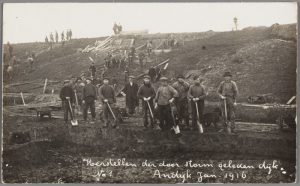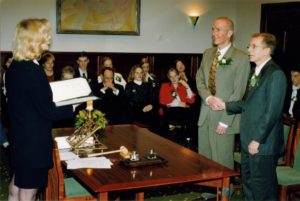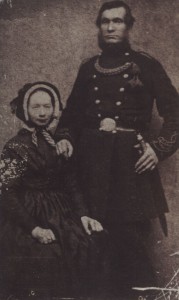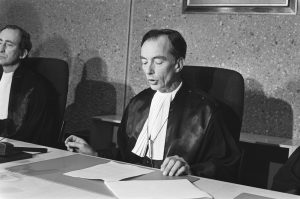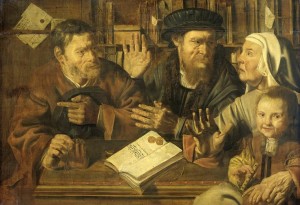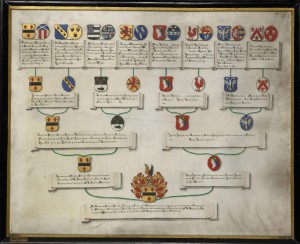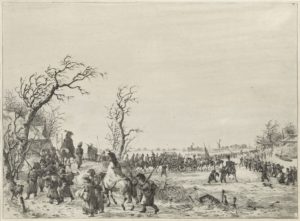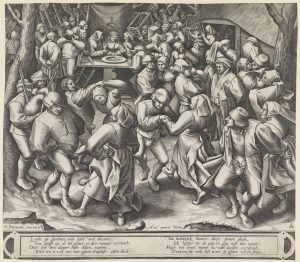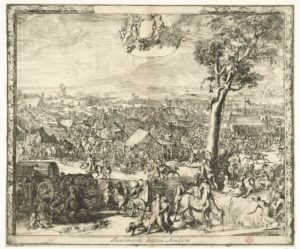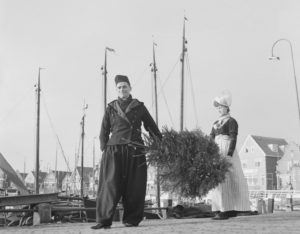A dijkwerker is a dike worker, somebody who creates and maintains dikes. In earlier times, people in a community that was protected by a dike would be required to help maintain the dike. Later, this was changed to a tax that paid professional dike workers to maintain the dikes. Taxes still pay for the upkeep of the dikes today. … [Read more...]
Dutch term – Geregistreerd Partnerschap
"Geregistreerd partnerschap" or registered partnership is a form of a civil union. It was introduced in the Netherlands in 1998 to allow same-sex couples to enjoy some of the same rights as married partners. The partnership is not limited to same-sex couples though: Male and female partners can also join in a registered partnership. The Geregistreerd Partnerschap can be seen as the predecessor of the same-sex marriage, which became legal in the Netherlands in 2001; the first country in the … [Read more...]
Dutch term – Veldwachter
A veldwachter was a police constable. In 1858, a national police force was established in addition to the municipal constabulary. From that period onwards, you will find a difference between a gemeenteveldwachter (municipal constable) and rijksveldwachter (national constable). Appointments of national constables can be found in the Staatscourant, which is available online at Delpher, or in the Algemeen Politieblad, which is available at the website of the Centraal Bureau voor Genealogie … [Read more...]
Dutch term – Rechtszitting
A rechtszitting is a court session. The protocols of the sessions can have detailed information about the charges, defense, and witness statements. Court records can often be found in regional archives. Some archives have put indexes online. Check the Digital Resources Netherlands and Belgium website to find out which sources are online for the region you're looking for. … [Read more...]
Source – Notarial records
Notarial records are created by a public notary and serve as legal proof of the information contained in the record. Information in notarial records Examples of the types of records you can find in notarial archives are: Real estate transactions (sales, conveyance) Debts Obligations Auctions Prenuptial agreements Last wills Estate divisions Work contracts Replacement contracts for enlisted men Powers of attorney A notary created copies of most of the records … [Read more...]
Dutch term – Probant
The probant or proband is the home person in a chart or narrative of the ancestors of the person. In the Sosa-Stradonitz numbering system, the proband has number 1, his father number 2, mother number 3, et cetera. … [Read more...]
Dutch term – IJzen
IJzen means to break the ice. During wartime, the ice in the moats around fortified towns had to be broken up, to prevent hostile forces from walking over the moat to take the town. Sometimes, ijzen was the obligation of the citizens of the town, or of specific farmers in the area who rented the farm from the overlord. In other towns, the garrison was responsible for making sure the moat did not freeze shut. … [Read more...]
Source – Publication of the banns
In the Netherlands, you have to go in "ondertrouw" before you get married. This means that the banns are read, giving everyone in the community a chance to object to the marriage. In the period before the introduction of the civil registration, church records are the most important source of vital information. Many churches recorded the banns rather than the marriage. They recorded when the couple registered the banns, and sometimes noted the marriage announcements on three different times, … [Read more...]
Dutch term – Markt
A markt is a market. During the Middle Ages, the right to hold markets was a seignorial right, granted by the overlord. The right to have a market was often the first step to becoming a chartered town. Today, many towns have a weekly market on a fixed day of the week. Sometimes, a market has been held on that same day in that town for more than four hundred years. In addition to the weekly markets, many towns also had a jaarmarkt, an annual market. That would be a major affair, where … [Read more...]
Dutch term – Tweede Kerstdag
Tweede Kerstdag is the Second Christmas Day, like Boxing Day in the UK. It is an official holiday in the Netherlands. The Second Christmas Day was introduced to facilitate going to church multiple times, and to have some time off for contemplation and relaxation. Nowadays, the Second Christmas Day is often used to visit in-laws, go to a concert, or do some shopping in furniture malls. Prettige Kerstdagen! (Happy Christmas Days) … [Read more...]
